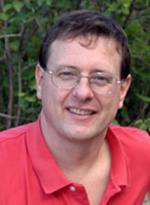

Main navigation | Main content

Andreas Stein has been appointed as a Merck Professor of Chemistry for a five-year term starting, July 1, 2015. This is one of five departmental professorships that recognize and reward the Department of Chemistry's most distinguished faculty. He has an outstanding record of research accomplishments and service to the department.
Stein has been a professor with the Department of Chemistry since 1994. He earned his bachelor’s degree in applied chemistry from the University of Calgary, and his doctorate in physical chemistry from the University of Toronto. He was a Natural Sciences and Engineering Research Council post-doctoral fellow at Bayer in Germany, and at the University of Texas, Austin, and was a post-doctoral fellow at Pennsylvania State University. He has also been a visiting professor at the University of British Columbia and at Fudan University in Shanghai, China.
He is an outstanding researcher. “Andreas is a well-known leader in the fields of nanostructured and porous materials,” wrote Professor J. Ilja Siepmann in his nomination for Stein for this professorship. “He has been at the forefront of porous materials synthesis, designing structures that enable applications as diverse as high-rate energy storage devices, structural pigments, bioactive materials, and ion-selective solid-state sensors. His important contributions have been widely cited by the materials chemistry and materials science research communities. A testament to the impact of his work is Andreas’ inclusion in the list of the World’s Most Influential Scientific Minds (based on the greatest number of highly cited papers between 2002 and 2012).”
A major focus of his research has been on the synthesis of porous and nanostructured materials and nanocomposites. Applications for these materials include energy storage (rechargeable batteries, supercapacitors), solar thermal energy conversion, bioactive glasses, ion-selective sensors, catalyst materials, polymer-clay and polymer-graphene nanocomposites, photonic crystal materials, and structural pigments.
In addition, Stein has a strong record of collaboration. A significant fraction of his interdisciplinary work is carried out in collaboration with researchers outside of chemistry, including materials science, chemical engineering, mechanical engineering, physics, and bioresources.
Professor Stein has been an adviser to 32 graduate students, 18 post-doctoral research associates, and 60 undergraduate students. He also contributes to the profession in a myriad of ways. He is currently on the advisory boards of the journals Advanced Functional Materials and Particle and has been an editorial advisory board member of Chemistry of Materials. He was recently a guest editor of a special issue of Zeitschrift für Anorganische und Allgemeine Chemie on “Silica-Based Nanoporous Materials,” an issue that brings together recent developments in the topic field from researchers around the world. Currently, he is co-editor of a six-volume Handbook on Solid State Chemistry, together with R. Dronskowski and S. Kikkawa. He has co-organized symposia and been on advisory boards for several international meetings related to porous materials.
He is actively involved in various aspects of public outreach. For example, Stein’s research group displayed images of porous and nanostructured materials in an exhibit by the Science Museum of Minnesota during Nanodays. He has participated in the Department of Chemistry outreach at the Minnesota State Fair for the past two years, and has also carried out numerous chemistry demonstrations for K–12 students. Within the Department of Chemistry, he has been a dedicated member of the Planning, Staffing and Resources Committee, Tenure Committee and Safety Committee over the last few years. At the college level, he has been a sought-after member of various fellowship committees.
Stein is one of two Merck professors in the Department of Chemistry. Siepmann is the other Merck professor.